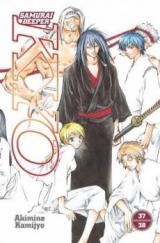As a quick request: CAN PEOPLE PLEASE STOP COMMENTING ABOUT HOW MUCH BETTER SDK IS FROM KENSHIN OR VICE-VERSA? If you feel so strongly about it, start a forum topic. If you argue about it here, you'll most likely just annoy people looking for good reviews of the series by taking up space, and it's very likely that it'll just evolve into a flame war. (It's fine to just compare their similarities and differences, though, but only to portray SDK, NOT to write a persuasive essay on how one is better than the other.) Thanks to anyone who took the time to read this. (Aaaaaaaaaand onto the actual review.)
SDK is an enjoyable series if you like swordfighting and the like, but it's still pretty far from perfect. As has been said, the character improvement in techniques and the opponents gained in later volumes begin to get to the DBZ point, in which there is no end in sight of how powerful a character can get. But this is still a manga worth your time.
ART: SDK boasts a unique art style that contains features portrayed in a more realistic light. This isn't to say that eyes are realistically sized or that hair isn't gravity-defying, but noses and lips (noses in particular) are drawn in a way that is more detailed and "realistic" than the check-mark style that many other series contain. Action scenes are also clean and easy to read, unlike the messier/sketchier styles that are sometimes implemented in shounen manga (beginning of Naruto and Trigun, for example).
CHARACTERS: If you're a fan of characterisation (and I'm assuming that everyone is), you'll enjoy the characters of SDK. Almost every character has his/her own past elaborated (except for very minor characters), which helps give them depth. Personality types are also not over-used, allowing for the cast of characters to be extremely unique. Flashbacks are not overwhelming, but they are utilised in a few cases for either foreshadowing or character development. A few villains also get this treatment, which really helps the reader understand why he/she might be acting the way he/she is.
(Warning: Very slight spoilers ahead, but they are only for people who have not gotten very far in the manga.)
PLOT: Here's where SDK doesn't particularly shine. In the beginning, there is no plot. A plot does eventually emerge, but it's somewhat similar to the plot of Inuyasha: try to get an object (in this case, Kyo's original body) that is kept by a very powerful person/group. Luckily this object isn't just for strength (it's to separate Kyoshiro and Kyo), so the urgency of getting it is increased. The similarity to Inuyasha is reduced in its focus by character development, and this helps the plot become more intriguing.
FIGHTING STYLES: Weapon-wise, SDK is FULL of interesting and varied weapons. This also helps increase the number of possible styles of fighting. However, since Kyo uses a sword, most of his opponents use katanas and the like. This might not be able to sustain most series to the length of SDK, but supernatural powers are introduced to the swordplay. These powers normally are loosely based in the elements, but there are a few that cannot be attributed as such. The use of these techniques make fight scenes more exciting, and each fight seems new depending on the enemy's style of fighting and level of skill. But, while there are a few moments in the manga where Kyo does have to train to learn more and certain techniques can hurt the user, Kyo himself does not seem to have a limit to his power. Even in the later manga, he just keeps growing, and this borderlines "ridiculous" when it's mentioned that this power is only a FRACTION of his true strength. In this respect, SDK is very much like DBZ. Luckily, this is only true for Kyo, for the most part.
For people who aren't particularly sensitive to unlimited power, this is a great swordfighting manga with characters that shine. However, if you avoid scenarios in which a character is "the best" and keeps getting better to keep up with advancing enemies, I don't think this is for you (even though this dislike destroys much of the shounen genre).





